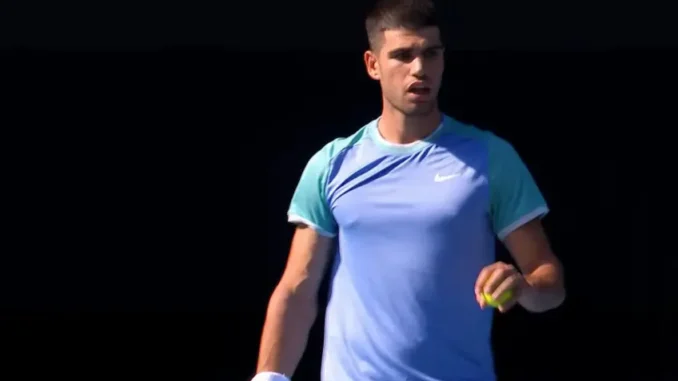
Reason Why Carlos Alcaraz is Roger Federer’s True Heir
The world of tennis has long been searching for the next icon to fill the void left by Roger Federer, whose elegance, skill, and unmatched charisma set him apart as one of the greatest players in the history of the sport. In Carlos Alcaraz, many believe they have found the perfect successor. The young Spaniard’s meteoric rise to the top of the ATP rankings and his dynamic style of play have drawn inevitable comparisons to the Swiss maestro. But what truly cements Alcaraz as Federer’s heir is more than just his talent; it’s his combination of artistry, athleticism, and a magnetic appeal that captivates fans worldwide.
At just 20 years old, Alcaraz has already achieved milestones that many seasoned players can only dream of. From winning Grand Slam titles to defeating some of the biggest names in tennis, he has demonstrated a maturity and poise that belies his age. His aggressive baseline game, impeccable footwork, and ability to dictate play are reminiscent of Federer’s prime. Yet, Alcaraz brings his own unique flair, blending Federer’s finesse with the raw power and tenacity of Rafael Nadal. It’s this fusion of styles that makes him a truly special player and a worthy successor to Federer’s legacy.
One of the most striking parallels between Alcaraz and Federer lies in their ability to make the sport look effortless. Federer was renowned for his graceful movement, his seemingly effortless transitions between offense and defense, and his ability to execute shots with surgical precision. Alcaraz, too, has an uncanny knack for making the impossible seem routine. Whether it’s a drop shot that dies on the court or a blistering forehand winner down the line, he exudes a sense of calm and control that is rare in players of his age.
What sets Alcaraz apart, however, is his fearlessness. Federer, especially in his younger years, was known for his daring shot selection and willingness to take risks. Alcaraz has embraced this same mindset, often attempting—and successfully executing—high-risk, high-reward shots in crucial moments. This boldness is not only a testament to his confidence but also a quality that endears him to fans. In an era where consistency and baseline rallies dominate, Alcaraz’s willingness to push the boundaries of the game is a breath of fresh air.
Off the court, Alcaraz shares Federer’s ability to connect with fans and the media. Federer’s charm and humility made him a global ambassador for tennis, and Alcaraz is following suit. Despite his rapid ascent, the young Spaniard remains grounded, frequently expressing gratitude to his team, family, and fans for their support. His interviews are characterized by a genuine enthusiasm for the sport and a refreshing humility that mirrors Federer’s early years. This likability, combined with his electrifying performances on court, has already earned him a massive global following.
Another key factor that ties Alcaraz to Federer’s legacy is their shared sense of sportsmanship. Federer was often lauded for his respect for opponents and his composure in both victory and defeat. Similarly, Alcaraz has shown remarkable maturity in handling the pressures of professional tennis. Whether he’s celebrating a hard-fought victory or reflecting on a tough loss, he approaches each moment with grace and dignity, embodying the spirit of fair play that Federer exemplified throughout his career.
While the stylistic and personal similarities between Alcaraz and Federer are evident, the young Spaniard’s rise also reflects a changing of the guard in men’s tennis. Federer, Nadal, and Novak Djokovic have dominated the sport for nearly two decades, setting a standard of excellence that seemed almost unattainable. Alcaraz’s emergence signals the dawn of a new era, one where young talents are ready to challenge the established order and forge their own legacies. Yet, unlike other promising players who have struggled under the weight of expectations, Alcaraz appears to thrive in the spotlight.
His performances in high-pressure situations further reinforce his status as Federer’s heir. Whether it’s a Grand Slam final or a match against a top-ranked opponent, Alcaraz consistently rises to the occasion, displaying a mental toughness that is essential for sustained success at the highest level. This composure, combined with his natural talent and relentless work ethic, suggests that his potential is boundless.
While it’s tempting to crown Alcaraz as Federer’s successor, it’s important to recognize that he is also carving out his own identity. He is not merely a replica of Federer but a unique player whose game reflects the influence of multiple legends while incorporating his own distinct qualities. In this sense, Alcaraz represents the evolution of tennis, blending the artistry of Federer, the intensity of Nadal, and the strategic acumen of Djokovic into a style that is uniquely his own.
As Alcaraz continues to develop and refine his game, the comparisons to Federer will only grow stronger. Yet, rather than being burdened by these expectations, he seems to embrace them, using them as motivation to reach even greater heights. His journey is just beginning, but the signs are clear: Carlos Alcaraz is not just the future of tennis; he is the embodiment of the sport’s timeless beauty and competitive spirit.
In the years to come, fans will undoubtedly continue to celebrate the legacy of Roger Federer, whose impact on tennis is immeasurable. At the same time, they will witness the rise of Alcaraz, a player poised to carry the torch forward. In doing so, he ensures that the elegance, passion, and excitement that Federer brought to the game will live on, inspiring a new generation of players and fans alike.
Carlos Alcaraz is not simply following in Federer’s footsteps—he is forging a path of his own while honoring the legacy of a true legend. And in that journey, he has already proven himself to be Roger Federer’s true heir.
Leave a Reply